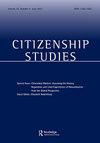公民语言的非殖民化
IF 1.9
3区 社会学
Q3 POLITICAL SCIENCE
引用次数: 1
摘要
本文探讨了语言如何成为公民研究非殖民化的一个有争议的场所。特别是,我研究了英语被用作书写公民身份的语言条件,并提出了这样一个问题:作为作者,如果要实现非殖民化的学术研究需要从殖民者的语言开始,我们该如何做到这一点?本文以Ngũgĩ wa Thiong ' o、Rey Chow、Jacques Derrida和Gloria Anzaldúa等作家为例,提出了在写作实践中嵌入的“殖民”期望,例如期望像母语人士一样写作,并对文本产生连贯的理解。我认为,这些作家的语言方法显示了写作成为非殖民化不可或缺的各种方式。在他们作品的基础上,我进一步建议我们可以采用不同的写作策略来进行非殖民化的公民研究。它们包括:使用少数民族语言进行写作;省级英语奖学金;培养作者独特的写作风格;并剥夺了文本。本文章由计算机程序翻译,如有差异,请以英文原文为准。
Decolonising the language of citizenship
ABSTRACT This article investigates how language becomes a contested site for decolonising the study of citizenship. In particular, I look at the linguistic conditions where the English language is used as a means of writing about citizenship and ask: how do we, as authors, decolonise scholarship if the very means to do so requires the language of the colonisers to begin with? Drawing on writers including Ngũgĩ wa Thiong’o, Rey Chow, Jacques Derrida, and Gloria Anzaldúa, this article problematises ‘colonial’ expectations embedded in the practice of writing, such as an expectation to write like a native speaker, and to produce a coherent understanding of the text. I argue that these writers’ approaches to language show various ways in which writing becomes integral to de/coloniality. Building on their works, I further suggest different tactics of writing we can adopt to decolonise citizenship studies. They include: using minoritised languages for writing; provincialising English-speaking scholarship; developing a writing style unique to the author; and disappropriating the text.
求助全文
通过发布文献求助,成功后即可免费获取论文全文。
去求助
来源期刊

Citizenship Studies
POLITICAL SCIENCE-
CiteScore
3.60
自引率
11.10%
发文量
85
期刊介绍:
Citizenship Studies publishes internationally recognised scholarly work on contemporary issues in citizenship, human rights and democratic processes from an interdisciplinary perspective covering the fields of politics, sociology, history and cultural studies. It seeks to lead an international debate on the academic analysis of citizenship, and also aims to cross the division between internal and academic and external public debate. The journal focuses on debates that move beyond conventional notions of citizenship, and treats citizenship as a strategic concept that is central in the analysis of identity, participation, empowerment, human rights and the public interest.
 求助内容:
求助内容: 应助结果提醒方式:
应助结果提醒方式:


